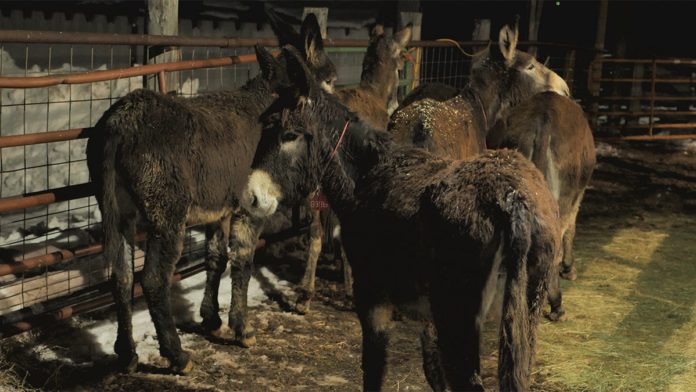Colorado Parks and Wildlife is getting creative in its efforts to mitigate wolf depredations on livestock in Northern Colorado. Wildlife officers with the state agency recently donated six wild burros to the Gittleson Ranch in Jackson County as part of a renewed effort to protect the herd from wolves, according to a recent CPW press release.
The Gittleson Ranch has already lost three cows to wolves this winter. The first depredation was confirmed on Dec. 21 and, according to the Colorado Cattlemen’s Association, “this was the first confirmed wolf kill of livestock in Colorado in over 70 years”.
It wouldn’t be the last. Wolves struck again three weeks later, attacking two border collies—and killing one—on another ranch in Jackson County. And on Jan. 18, Don Gittleston contacted CPW to notify the agency that wolves had killed two more of his cows, marking the state’s third confirmed wolf depredation in 30 days.
This attack also came roughly a week after the Colorado Wildlife Commission instituted emergency hazing regulations that allow ranchers to use non-lethal methods to haze wolves and guard their livestock. Those methods include the use of rubber bullets, noisemakers, and guard animals.
Using wild burros to prevent wolf attacks is a newer tactic for wildlife officers in the region. But CPW officer Zach Weaver explained the move in last Thursday’s press release, noting that USDA’s Animal and Plant Health Inspection Service has had some success using the animals to ward off wolves in Oregon. He said that, according to APHIS, the burros were more effective than other non-lethal methods such as fladry and noisemakers.
“We learned that wild burros are more effective,” Weaver said, “because they’ve been in the wild where they’ve had to defend themselves and their herd from predation from animals like mountain lions and coyotes.”
So Weaver and fellow CPW Wildlife Officer Josh Dilley drove out to Utah on Feb. 27 to pick up six wild burros from the Axtell Wild Horse and Burro Facility. The four jennies and two gelded jacks had recently been removed from the high country in Nevada, and since the majority of Jackson County sits above 8,000 feet, this was an important factor in their decision.
“Don [Gittleson] and I wanted animals that had been at a higher elevation, so they were acclimated and had developed hair for the cold,” Weaver explained. He said Gittleston Ranch will serve as a pilot program for the use of wild burros on other area ranches, and that “a lot of our monitoring will be based on feedback from Don for this pilot program.”
That feedback can’t come soon enough. The rest of northern Colorado’s ranching community is still on high-alert after the string of attacks that occurred earlier this winter, and their fears were reignited last week when ranch hands at the State Line Ranch had to put down an 8-year-old pregnant heifer that was attacked by wolves.
“Horrible. She was in bad shape,” one of the cowboys told the Colorado Sun last Friday.
Wildlife managers investigating the incident confirmed that it was a wolf depredation based on the tracks and the consistency of the bite marks on the cow. The ranch, which isn’t very far from the Gittleston property, is being reimbursed for the cow based on Colorado law.
Read Next: Colorado Wildlife Officials Confirm State’s Third Wolf Depredation in 30 Days
These continued attacks serve to highlight the sticky situation that CPW finds itself in regarding the management of wolves. In 2020, Colorado voters narrowly approved the reintroduction of wolves to the state, and the statute directs Colorado Parks and Wildlife to create a reintroduction and management plan by Dec. 31, 2023. (The wolves depredating livestock in northwest Colorado are not reintroduced wolves, but rather animals that likely worked their way down from southern Wyoming.) And due to the recent ruling by a U.S District Court in California restoring federal endangered species protections to gray wolves, CPW will now have to collaborate with the U.S Fish and Wildlife Service to develop any management plans for the species.
In addition to federal protections, gray wolves are currently a state-designated endangered species in Colorado. They cannot be killed for any reason other than self-defense, and taking a gray wolf in the state can result in the loss of hunting privileges, massive fines, and even jail time.


